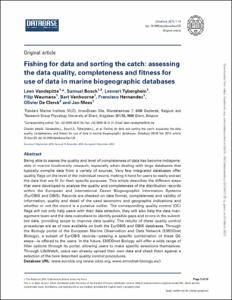Fishing for data and sorting the catch: assessing the data quality, completeness and fitness for use of data in marine biogeographic databases.

View/
Average rating
votes
Date
2015Author
Vandepitte, Leen
Bosch, Samuel
Tyberghein, Lennert
Waumans, Filip
Vanhoorne, Bart
Hernandez, Francisco
De Clerck, Olivier
Mees, Jan
Metadata
Show full item recordAbstract
Being able to assess the quality and level of completeness of data has become indispensable
in marine biodiversity research, especially when dealing with large databases that
typically compile data from a variety of sources. Very few integrated databases offer
quality flags on the level of the individual record, making it hard for users to easily extract
the data that are fit for their specific purposes. This article describes the different steps
that were developed to analyse the quality and completeness of the distribution records
within the European and international Ocean Biogeographic Information Systems
(EurOBIS and OBIS). Records are checked on data format, completeness and validity of
information, quality and detail of the used taxonomy and geographic indications and
whether or not the record is a putative outlier. The corresponding quality control (QC)
flags will not only help users with their data selection, they will also help the data management
team and the data.....
Journal
DatabaseVolume
2015Page Range
14pp.Document Language
enSustainable Development Goals (SDG)
14.aMaturity Level
Pilot or DemonstratedDOI Original
https://doi.org/10.1093/database/bau125Citation
Vandepitte, L. et al (2015) Fishing for data and sorting the catch: assessing the data quality, completeness and fitness for use of data in marine biogeographic databases, Database, Volume 2015:bau125, 14pp. DOI: https://doi.org/10.1093/database/bau125Collections
The following license files are associated with this item:
 Repository of community practices in Ocean Research, Applications and Data/Information Management
Repository of community practices in Ocean Research, Applications and Data/Information Management
